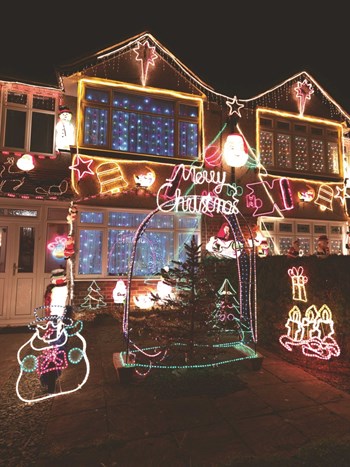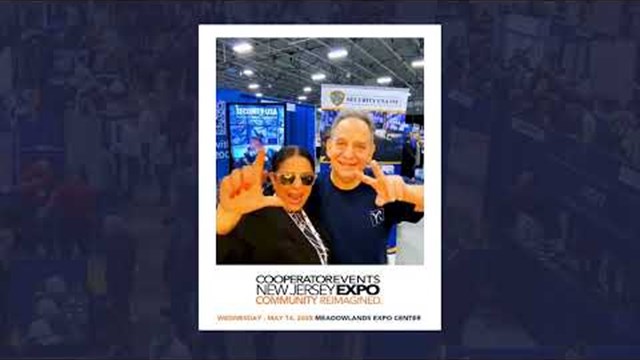
Holidays are usually synonymous with good cheer, smiles, and a festive atmosphere—but occasionally, they can be the cause of friction and ill will as well. When people of various faiths and traditions all live in the same high-rise building or HOA, rules and aesthetics for holiday decorating have to take into account the whole community—not just those members who happen to be a part of the dominant culture. Good boards and managers tread carefully and are mindful of their associations' diverse residents when it comes to mapping out policy for holiday decorating in common areas such as lobbies, garages, hallways and balconies.
Spelling it Out
In New Jersey, there are no statewide rulings about how much is too much, how religious is too religious and how long is too long to keep up those holiday lights. So it all must be decided and regulated by cooperative and condominium boards. In an effort to keep everyone happy, many of the management companies suggest that boards have formal decorating policies related to holiday décor.
Those decorating policies vary depending on the size of the building, says Joseph Guido, a property manager with Denali Property Management Inc., with offices in Jersey City and Chester.
“Bigger buildings have more structured policies,” Guido says. “Smaller building residents tend to just get together and do their own things. Some buildings simply manage a holiday policy, but there’s a handful of others that don’t want any decorations whatsoever.”
But whenever people live together in the same building, there’s a chance that someone will be upset about the décor—or lack of décor—that the board decides to install in the hallway and lobby. So regardless of what you decide to do for your specific building, you should plan it out ahead of time and put something in writing that all the residents can view so everyone’s prepared before the drama has the possibility of starting, says Martin Laderman, chief executive officer of MEM Property Management Corporation, based in Jersey City and Somerset.
That’s because there’s more to think about than simply decorating the lobby and the common hallways. Some residents go to extremes when putting holiday décor on their balconies too.
“Common sense is not always common,” Laderman says. “We recommend that they put something in writing, because sometimes the decorations can get out of hand.”
The declaration needs to touch upon overt religious overtones of decorations, what types of ornaments, lights and décor can be in the common hallways, balconies and windows, how much to put in the lobby and even the size of the holiday items.
For example, says Liz Comando, a principal with RCP Management in Elmwood Park, her declarations tend to spell out that exterior lights are permitted in most townhome associations, but not in high rise common hallways. Holiday wreaths are permitted on unit doors but they can’t play music.
“We once had an owner put a holiday wreath up with a motion sensor that would play songs when anyone walked by,” Comando says. “We did receive complaints and reached out to the owner. When we explained the situation to the owner, the owner agreed to remove the batteries.”
Flashing lights are also a big point of contention—especially if the lights are in the hallway and their shadows reflect inside a unit. Flashing or strobing lights also trigger migraines in some people, so displays involving them may not be acceptable in the lobby area either. Also, if the lights are plugged into a common area outlet in a hallway, then the association’s electricity bills may spike if it’s a big building and there are extra lights on every floor.
Guido says many residents in his building have faced same problem with blinking lights, so now his buildings restrict blinking lights to the lobby or the common area so the hallways don’t look disorganized.
Involve Everyone
Those common areas aren’t immune to decoration complaints either, however, since residents like to be able to have some say and control over the aesthetics of those places too.
Guido suggests creating a social or a decoration committee who will sketch their ideas out and survey the building to make sure everyone—or at least the majority of the residents—like the look of the decorations. “You want to avoid just doing something because if you do something without talking to everyone, you’re going to be criticized,” Guido says.
Typically, the declaration only refers to overall holiday décor rather than specific holidays—despite the fact that residents tend to get into the largest number of holiday decoration arguments in the month of December. But if they already know that they’re limited by how many flashing lights or obtrusive items they can put up in the common areas, they can apply the same knowledge to other holidays, such as the Fourth of July or Thanksgiving.
Safety First
Other rules should be put in place to make sure the building is not violating any fire codes with its decorations.
Candles shouldn’t be allowed in the hallways because they could be a fire hazard, and wreaths should be hung via over-the-door hangers instead of on top of nails. Live Christmas trees should be bagged when entering and exiting the property to avoid showers of prickly, potentially flammable needles from going everywhere, and any needles left behind must be vacuumed immediately.
Common hallways usually can’t host any obstructions such as Christmas trees or big statues due to fire regulations, so boards must speak with their local fire department about what they can and can’t do to stay within code.
Boards should also take note that dry trees are a fire hazard, so some buildings have restricted their use altogether or given deadlines as to when they must be removed.
“The biggest issue is removal and disposal,” Laderman says. He likes to give out large bags that residents can put their Christmas trees when bringing them through the lobby and hallways so they don’t make a mess. Then, he chooses a day when all the trees get picked up so they only need to vacuum the building once.
Festive–and Fair
If residents don’t follow the rules, the management company will speak with them and give them a warning. If they continue ignoring the declaration, they could get a fine.
“We don’t want to be the scrooge, but you need rules,” he says.
Guido agrees. In his buildings, the Christmas decorations may be put up after Thanksgiving, and they have to be taken down a week or two after New Year’s Eve.
Perhaps the trickiest part of holiday decorating has to do with making sure no one’s offended when it comes to the religious aspect of the holidays.
There have been many legal battles regarding religious items—most recently the case in Chicago about a mezuzah on the door post of a Jewish family’s unit—so lawyers recommend that associations don’t attempt to restrict anyone on the basis of religion. To make sure their grounds are covered, rules should be reviewed by the association’s attorney prior to adoption so that issues of this nature are within the legal rights.
At the same time, association administrators can certainly encourage residents to refrain from displaying overtly religious décor in favor of something more neutral – as long as they merely make the suggestion and do not discriminate against any resident.
Comando says her buildings have managed to avoid any major complaints by forming decorating committees that are made up of different cultures and nationalities so every religion is represented. “They work together on recommending a policy to the board that will include how the lobby and common areas will be decorated as well as unit doors,” Comando says.
Guido says he tries to accommodate residents by balancing the holidays. So if there’s a Christmas tree up for Christmas, they always put up a menorah for Hanukkah. And if residents celebrate a less common holiday, they can let the board know about it so the board can put up something that represents them too.
As long as the decorations don’t make any noise and don’t contain flashing lights and aren’t offensive, Guido says that if the residents want to put up a little holiday décor representing their religion on their doors, it’s not a big deal.
Laderman says that problems in his buildings regarding religious paraphernalia only arise if residents’ décor is in bad taste. He’s had to recommend to the board that nude Santa Clauses and reindeers decorated as hooters shouldn’t be allowed.
All the rules in the world won’t do any good if the residents don’t know about them before they buy their decorations, however.
In addition to being outlined in the rules and regulations, associations should put a posting in the lobby about two months before each holiday reminding the residents of the newest rules.
Laderman says the boards in his buildings have many conversations about the holidays many months before they arrive, and they set the official rules for the residents in November so there are no surprises.
Those rules should also be reviewed again as soon as the holidays are done to make sure they still make sense for the building—and that there were no major problems. If there were any complaints, this leaves nearly a year to resolve them so the board doesn’t look like a Grinch when the same issues pop up again the following year.
But also be aware that most people do want to celebrate the holidays with a few decorations, so try not to throw up your hands and ban everything. Remember, as the popular Biblical-based folk song by The Byrds so eloquently relates, “To everything there is a season, and a time for every purpose under heaven.”
Danielle Braff is a freelance writer and a frequent contributor to The New Jersey Cooperator.






Comments
Leave a Comment